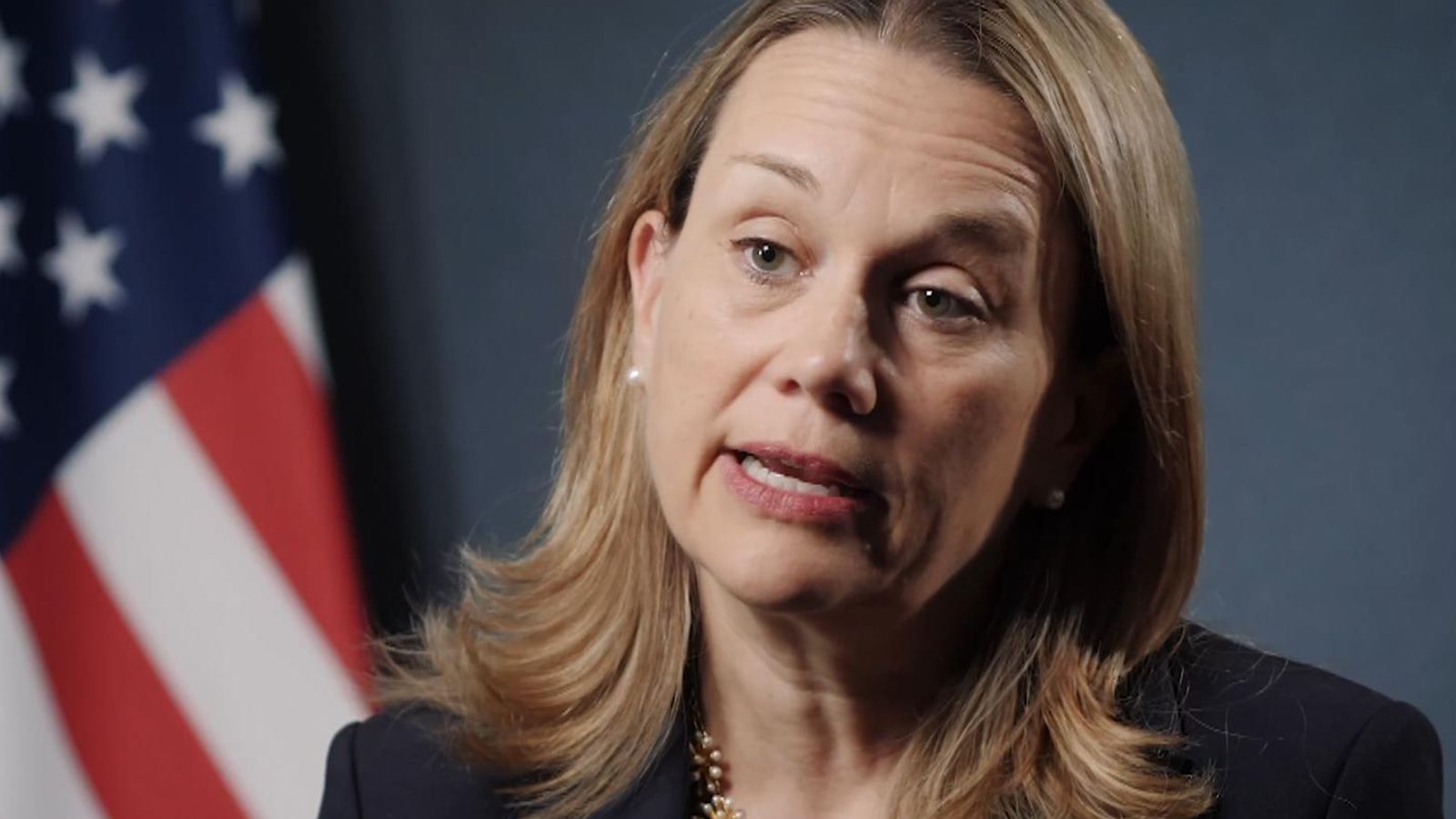Ukraine’s president will be “relieved” when he sees what allies will offer his country around NATO membership at a major summit in Lithuania this week, a senior US diplomat has said.
Julianne Smith, the US ambassador to NATO, told Sky News she expects Volodymyr Zelenskyy to attend the two-day conference, which starts on Tuesday, in person.
Offering a sense of how allies will show Kyiv they are increasingly committed to Ukraine joining the club, the envoy said Washington supported a fast-track route to accession.
“I expect President Zelenskyy to come and I think he will feel relieved to see the unity that the alliance is showcasing in this moment and the full package of concrete deliverables that the alliance is prepared to offer,” she said in an interview on Monday in the Lithuanian capital of Vilnius, where the summit of NATO leaders and partners will be taking place, including with US President Joe Biden and the UK’s Rishi Sunak.
The removal of the need for a so-called membership action plan – a formal programme of political and military reform that candidate states are typically required to fulfil before joining – is something that Ukraine has been pushing for and that has been championed by the UK.
Ms Smith said it was “entirely possible” a commitment to ditch such a requirement would be included in the wording on Ukraine in a final communique from the summit.
Her comments backed up an announcement by Ukraine’s foreign minister on Twitter that all NATO allies – 31 member states – had reached a consensus on ditching the membership action plan requirement.
Joe Biden says US-UK relationship ‘rock solid’, despite disagreements over Ukraine
As NATO prepares to meet, the US will seek to calm its critics over sending cluster munitions to Ukraine
NATO head ‘absolutely’ confident allies will agree on formal wording about Ukraine’s alliance membership
“I welcome this long-awaited decision that shortens our path to NATO,” Dmytro Kuleba wrote. “It is also the best moment to offer clarity on the invitation to Ukraine to become a member.”
The US ambassador rejected a suggestion that other allies had put pressure on the United States to go further than it intended on the issue of Ukraine’s future membership to NATO.
Certain member states such as Lithuania and the other Baltic nations had sought a specific “pathway” that went much further than a more open-ended commitment agreed at a previous summit in 2008 that the door was open for Ukraine’s membership given Russia’s full-scale invasion and the need to offer Kyiv long-term security guarantees.
Others, however, such as Germany, have been more cautious. Ukraine is still locked in a war of survival with Russia. Ensuring the Ukrainian military succeeds in defeating Russia’s war is the primary objective of NATO allies.
Describing the nature of the discussions that have taken place, Ms Smith said: “We all had different perspectives… We all came with different histories, different perspectives on it and it has taken us the last couple of weeks to really come together and reach consensus.”
Read more:
Why tensions are escalating at the Zaporizhzhia nuclear plant
Why ‘steel rain’ cluster munitions won’t break NATO unity
A large sign on the outskirts of Vilnius summed up the Lithuanian position, with the words: “Ukraine deserves NATO membership now.”
Asked whether she agreed with that sentiment, Ms Smith reaffirmed that all allies agree Ukraine will become a member and that the offer this week to Kyiv would be “moving beyond” simply restating the language from the Bucharest summit in 2008.
“If President Zelenskyy comes to the summit this week – and we believe that he will – we think that we are going to have a lot on offer,” she said.
“We are going to have a whole collection of deliverables for him outlining an enhanced political relationship. We are going to have more practical support over the long term and we’re going to have something to say about Ukraine’s membership aspirations.”
Please use Chrome browser for a more accessible video player
Another focus in the run up to the summit is around whether Turkey will finally lift an objection to Sweden joining NATO – something Stockholm has been trying to do since last year, having ended a historic policy of neutrality in the wake of Russia’s full-scale invasion of Ukraine.
In the latest twist, Turkish President Tayyip Erdogan said the European Union should open the way for Ankara’s accession to the bloc before Turkey’s parliament approves Swedish membership to NATO.
The US ambassador said Washington supported Ankara’s desire to join the EU but that it wanted the focus this week to be on NATO.
“We really would like to see Sweden become a member of the alliance as soon as possible,” she said.
As for what success at the summit would look like, Ms Smith said the gathering of the leaders of the NATO alliance on its eastern flank, close to Russia and Ukraine, would send a signal of unity and strength to Russian President Vladimir Putin that “you cannot wait us out and we will stand with Ukraine for as long as it takes”.








